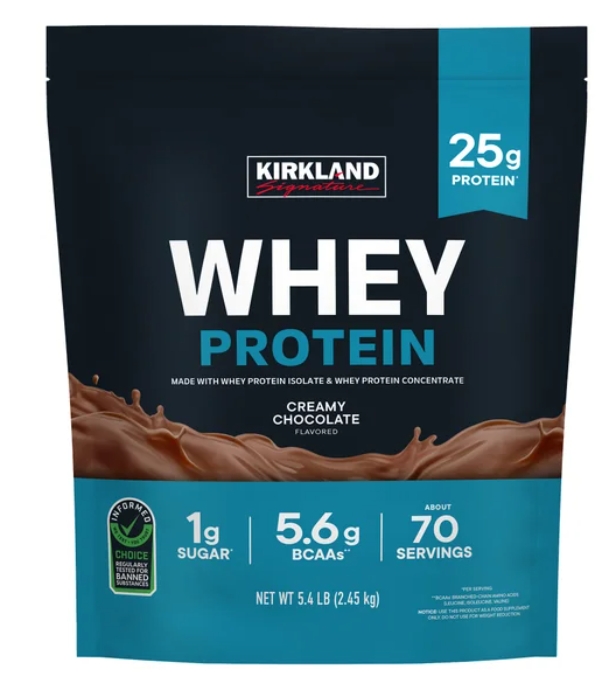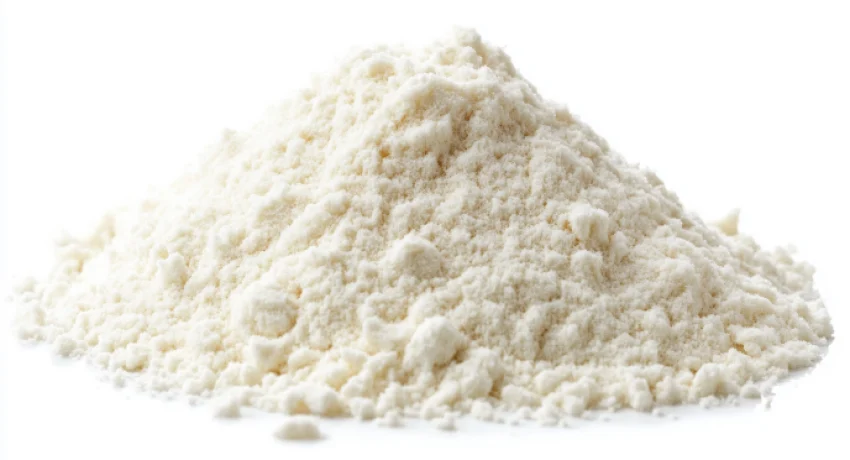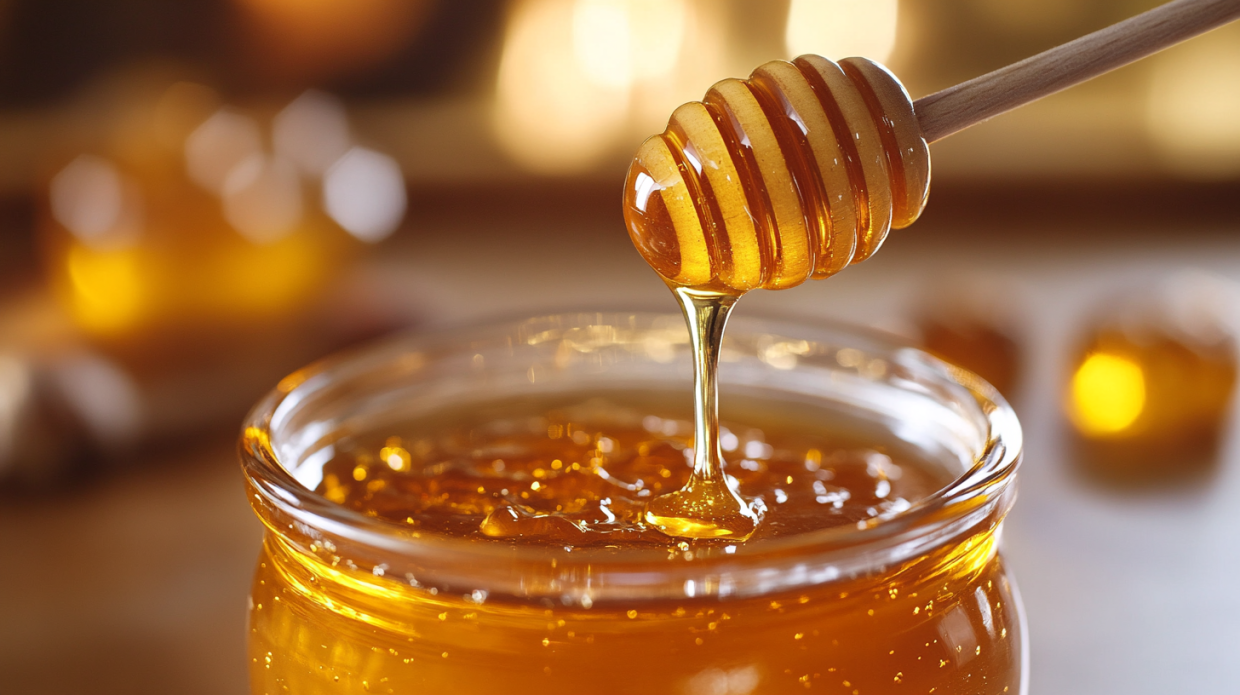
Kirkland Signature Whey Protein, Creamy Chocolate, 5.4lbs
- 25g Whey Isolate & Concentrate
- 1g Sugar*, 3 Net Carbs*
- 5.6g BCAA’s
- *Per Serving
- **BCAAs: Branched-Chain Amino Acids
Affordable Premium Nutrition That Doesn’t Compromise on Quality
In the vast universe of fitness supplements, finding the perfect protein powder can feel like searching for a needle in a haystack. With countless brands competing for your attention and wallet, it’s easy to get overwhelmed by flashy marketing, celebrity endorsements, and premium price tags. But what if I told you that one of the best protein powders on the market has been hiding in plain sight at your local Costco? Kirkland Signature Protein Powder offers exceptional quality at a fraction of the cost of leading brands, making it the smart choice for fitness enthusiasts on a budget.
As someone who has experimented with dozens of protein supplements over the years, I’ve learned that price doesn’t always correlate with quality. Sometimes, the most unassuming products deliver the best results. That’s precisely the case with Kirkland’s protein powder, which has quietly built a loyal following among fitness enthusiasts who know a good deal when they see one.
Let’s dive deep into everything you need to know about this cost-effective supplement that’s challenging the industry giants.
What Exactly Is Kirkland Protein Powder?
Kirkland Signature is Costco’s private label brand, known for offering high-quality products that rival name brands at significantly lower prices. Their protein powder is no exception. It’s a high-quality supplement designed to help fitness enthusiasts meet their protein requirements, support muscle recovery, and achieve their fitness goals.
The Kirkland Signature Protein Powder is primarily whey-based, derived from milk and processed to create a protein-rich powder that’s easily digestible and quickly absorbed by the body. Whey protein is particularly valued in the fitness community for its complete amino acid profile, including all nine essential amino acids that our bodies cannot produce on their own.
What sets Kirkland’s offering apart from many competitors is its commitment to quality ingredients without the premium price tag. Each serving delivers a substantial amount of protein with minimal added sugars and fats, making it an excellent option for those looking to supplement their protein intake without consuming unnecessary calories.
Where Can You Purchase Kirkland Protein Powder?
As a Costco private label product, Kirkland Signature Protein Powder is primarily available at Costco warehouse locations across the United States and Canada. This exclusivity is part of Costco’s business model, which allows them to offer their members high-quality products at competitive prices.
If you’re a Costco member, you can find Kirkland Protein Powder in the supplement section, typically near other health and fitness products. The distinctive packaging makes it easy to spot—look for the large tubs with the Kirkland Signature branding.
For those who prefer online shopping, Kirkland Protein Powder is also available on Costco’s website for members. Occasionally, you might find it on other online marketplaces like Amazon, though prices may be higher than purchasing directly from Costco due to third-party sellers.
It’s worth noting that while a Costco membership does require an annual fee (starting at around $60 for a basic membership), the savings on products like Kirkland Protein Powder often quickly offset this cost for regular shoppers.
The Price Point: A True Value Proposition
One of the most compelling aspects of Kirkland Protein Powder is its price. In an industry where premium protein powders can cost upwards of $1-2 per serving, Kirkland delivers exceptional value at approximately $0.50-0.70 per serving, depending on current pricing.
A typical container of Kirkland Signature Protein Powder contains about 75 servings and costs approximately $40-50 (prices may vary slightly by location). This breaks down to roughly half the cost of comparable name-brand protein powders with similar nutritional profiles.
For context, a container of Optimum Nutrition Gold Standard Whey—one of the most popular protein powders on the market—typically costs around $60-70 for 71-77 servings. This makes Kirkland’s offering nearly 30-40% less expensive while delivering comparable quality.
This value proposition becomes even more impressive when you consider that the cost savings don’t come at the expense of quality. Kirkland hasn’t cut corners on ingredients or manufacturing standards to achieve these low prices; they’ve simply leveraged Costco’s massive purchasing power and eliminated the marketing overhead that inflates the cost of many name-brand supplements.
Flavor Options: Limited but Well-Executed
When it comes to flavors, Kirkland takes a “quality over quantity” approach. Unlike some brands that offer dozens of exotic flavor options, Kirkland Protein Powder typically comes in just two varieties: Chocolate and Vanilla.
While this might seem limiting at first glance, there’s a certain wisdom to this approach. Rather than spreading their efforts thin across numerous flavors, Kirkland has perfected these two staple options. The chocolate variant offers a rich, satisfying taste that isn’t overly sweet or artificial, while the vanilla provides a versatile base that works well on its own or when mixed with other ingredients in smoothies.
Many users report that both flavors are pleasant and drinkable—a crucial factor for a supplement you’ll likely consume daily. The relatively neutral profile of both flavors also makes them excellent bases for customization. The vanilla, in particular, works wonderfully as a canvas for adding fruits, nut butters, or other flavor enhancers in smoothies.
The limited flavor selection also simplifies the manufacturing process, potentially contributing to the product’s affordability without sacrificing taste quality.
Whey-Based Formulation: The Gold Standard of Protein
Kirkland Signature Protein Powder is primarily whey-based, containing a blend of whey protein isolate and whey protein concentrate. This combination offers several advantages over single-source or plant-based proteins.
Whey protein isolate undergoes additional processing to remove most of the fat and lactose, resulting in a higher protein percentage by weight (typically 90% or more). This makes it especially beneficial for those looking to maximize protein intake while minimizing calories. It’s also easier to digest for people with mild lactose sensitivities.
Whey protein concentrate, while slightly lower in protein content (typically 70-80% protein by weight), retains more of the beneficial nutrients found in whey. This includes various bioactive compounds that may support immune function and overall health.
By combining these two forms of whey, Kirkland creates a protein powder that offers rapid absorption, excellent digestibility, and a complete amino acid profile. The whey-based formulation makes it particularly effective for post-workout recovery, when muscles need quick access to protein for repair and growth.
It’s worth noting that while Kirkland doesn’t currently offer a plant-based alternative, their whey protein is suitable for lacto-vegetarians (those who consume dairy but not meat).
Ingredient Quality: Transparency and Clean Formulation
Examining the ingredient list of Kirkland Protein Powder reveals a refreshingly clean formulation compared to many competitors. The main ingredients are straightforward: whey protein isolate, whey protein concentrate, cocoa powder (in the chocolate version), natural and artificial flavors, and a few additives for texture and sweetness.
Here’s what you’ll find in a typical container of Kirkland Signature Protein Powder:
- Whey protein isolate and concentrate (providing the primary protein source)
- Cocoa powder (in chocolate flavor)
- Natural and artificial flavors
- Lecithin (as an emulsifier to improve mixability)
- Acesulfame potassium and sucralose (zero-calorie sweeteners)
- Gum blend (for texture)
What’s notably absent from this list are excessive fillers, artificial colors, and unnecessary additives that often populate the ingredient lists of cheaper protein powders. Kirkland has focused on delivering a product that emphasizes protein content while minimizing unnecessary ingredients.
For those concerned about sweeteners, it’s worth noting that Kirkland does use artificial sweeteners (acesulfame potassium and sucralose) rather than sugar to keep the calorie count low while maintaining palatability. While these sweeteners are FDA-approved and generally recognized as safe, individuals who prefer to avoid artificial sweeteners entirely should take this into consideration.
Nutritional Profile: Impressive Protein-to-Calorie Ratio
One of the most important aspects of any protein powder is its nutritional profile, and Kirkland Signature doesn’t disappoint. Each serving (approximately 30 grams) provides:
- 24-25 grams of protein
- 2-3 grams of carbohydrates
- 1-2 grams of fat
- 130-140 calories
This translates to an impressive protein-to-calorie ratio, with protein accounting for approximately 70-75% of the total caloric content. This makes it an excellent option for those looking to increase their protein intake without significantly impacting their overall calorie consumption.
The 24-25 grams of protein per serving is comparable to premium brands like Optimum Nutrition Gold Standard, which typically offers 24 grams per serving. This high protein content makes Kirkland an excellent option for supporting muscle recovery and growth, especially when consumed after resistance training.
Additionally, the product contains naturally occurring branched-chain amino acids (BCAAs) from the whey protein, which are particularly important for muscle protein synthesis. While Kirkland doesn’t fortify their protein with additional BCAAs as some premium brands do, the natural content from high-quality whey is sufficient for most users’ needs.
Dietary Considerations: Allergens and Restrictions
For those with dietary restrictions or allergies, it’s important to note that Kirkland Protein Powder contains dairy (whey) and soy lecithin (used as an emulsifier). This makes it unsuitable for those with dairy allergies, lactose intolerance (though lactose content is minimal in whey isolate), or soy allergies.
Regarding gluten, while the product doesn’t contain wheat-derived ingredients, Kirkland does not explicitly market it as certified gluten-free. Those with celiac disease or severe gluten sensitivities should approach with caution or contact the manufacturer for more specific information about manufacturing practices.
For keto dieters, Kirkland Protein Powder can fit nicely into a ketogenic eating plan due to its low carbohydrate content (2-3 grams per serving). The minimal carb count won’t significantly impact ketosis, making it a suitable protein supplement for those following a ketogenic lifestyle.
As mentioned earlier, the product is suitable for lacto-vegetarians who consume dairy products but not appropriate for vegans due to its whey content.
Mixability and Texture: User Experience Matters
Even the most nutritionally superior protein powder is worthless if it’s unpleasant to consume. Fortunately, Kirkland Protein Powder performs admirably in terms of mixability and texture.
Users consistently report that the powder dissolves easily with minimal clumping when mixed with water, milk, or other liquids. A few quick shakes in a shaker bottle or brief blending is typically all that’s needed to achieve a smooth consistency.
The texture is relatively light and not overly thick or chalky—a common complaint with lower-quality protein powders. When mixed with water, it creates a light, drinkable shake that doesn’t feel like a meal in itself. When blended with milk, it takes on a more substantial, milkshake-like consistency that many users find satisfying.
This excellent mixability makes Kirkland Protein Powder versatile for various applications beyond basic shakes. It incorporates well into smoothies, overnight oats, protein pancakes, and other recipes where protein powders are commonly used.
Comparisons to Premium Brands: How Does It Stack Up?
When comparing Kirkland Protein Powder to industry leaders like Optimum Nutrition Gold Standard Whey or Muscle Milk, the similarities are striking—especially considering the price difference.
In terms of protein content, Kirkland offers 24-25 grams per serving, which is on par with Optimum Nutrition’s 24 grams and slightly higher than some Muscle Milk products. The calorie count is also comparable, with Kirkland’s 130-140 calories per serving similar to Optimum Nutrition’s approximately 120-130 calories.
The main differences emerge in a few specific areas:
- Flavor variety: Premium brands typically offer more flavor options than Kirkland’s chocolate and vanilla.
- Additives: Some premium brands include additional ingredients like added enzymes for digestion or extra BCAAs and glutamine. Kirkland keeps its formulation simpler.
- Processing methods: Brands like Optimum Nutrition emphasize their filtration and processing techniques. While Kirkland doesn’t market their processing methods as heavily, the end nutritional profile suggests similar quality standards.
- Third-party testing: Some premium brands highlight their third-party testing for quality and purity. While Costco has rigorous quality control for Kirkland products, they don’t market specific third-party certifications for their protein powder.
Despite these differences, the core functionality—providing high-quality protein with a good amino acid profile at a reasonable calorie count—is remarkably similar between Kirkland and premium brands. For most consumers, these differences don’t justify the significant price premium of the name brands.
Effectiveness for Muscle Building: Real Results
For those wondering about Kirkland Protein Powder’s effectiveness for muscle building, the science is clear. The primary factors determining a protein powder’s effectiveness for muscle growth are:
- Protein content per serving
- Amino acid profile (particularly leucine content)
- Digestibility and absorption
Kirkland Protein Powder checks all these boxes with its whey-based formulation. Whey protein is rich in leucine, the amino acid most directly responsible for triggering muscle protein synthesis. With 24-25 grams of protein per serving, Kirkland provides enough protein to maximize the muscle-building response after exercise, according to most research.
Multiple studies have shown that whey protein supplementation, when combined with resistance training, enhances muscle hypertrophy (growth) and strength gains compared to training without supplementation. Since Kirkland provides high-quality whey at the recommended dosage, users can expect similar benefits to those observed in these studies.
Many regular users report satisfactory results when using Kirkland Protein Powder as part of their muscle-building regimen. Of course, individual results will vary based on training program, overall diet, recovery practices, and genetics—but the protein powder itself provides the necessary building blocks for muscle growth.
Meal Replacement Potential: Convenient but Not Complete
While Kirkland Protein Powder can be used as a partial meal replacement in a pinch, it’s important to understand its limitations in this regard. With approximately 130-140 calories per serving, it falls far short of the caloric content of a complete meal for most adults.
Additionally, protein powders—including Kirkland’s—lack the complete spectrum of vitamins, minerals, fiber, and phytonutrients found in whole foods. They’re designed to supplement protein intake, not replace entire meals.
That said, Kirkland Protein Powder can be incorporated into meal replacement strategies in several ways:
- Enhanced smoothies: Combining the protein powder with fruits, vegetables, healthy fats (like avocado or nut butter), and perhaps some oats or other grains creates a more complete meal replacement.
- Post-workout nutrition: When consumed with a carbohydrate source like fruit or toast, it can serve as a sufficient post-workout meal for many people.
- Protein-enhanced foods: Adding the powder to oatmeal, yogurt, or other foods increases their protein content and satiety value, making them more suitable as meal replacements.
For those using protein shakes as occasional meal replacements due to time constraints or convenience factors, Kirkland Protein Powder is certainly a cost-effective option. However, it shouldn’t regularly replace whole food meals in a balanced diet.
Consumer Reviews: The Verdict from Regular Users
The true test of any product is consumer satisfaction, and Kirkland Protein Powder has amassed a strong following of loyal users. Reviews on Costco’s website and various fitness forums consistently award the product 4+ stars out of 5, with many users specifically highlighting the value proposition.
Common positive feedback includes:
- Excellent value compared to name brands
- Good taste that isn’t overly sweet or artificial
- Smooth texture with minimal clumping
- Effective for recovery and muscle-building goals
- Digestibility (many report less bloating than with some other brands)
The most common criticisms center around the limited flavor options and the use of artificial sweeteners, though these are clearly matters of personal preference rather than quality concerns.
Many long-term users report switching from premium brands to Kirkland and noticing no difference in their results, only in their supplement budget. This real-world feedback, combined with the product’s nutritional profile, strongly suggests that Kirkland Protein Powder delivers on its promises without the premium price tag.
Practical Usage Tips: Getting the Most from Your Kirkland Protein Powder
To maximize the benefits of Kirkland Protein Powder, consider these practical usage tips:
- Timing matters: Consume a serving within 30-60 minutes after resistance training to support muscle recovery and growth.
- Mix with milk for added nutrition: While water works fine for mixing, using milk adds additional protein, calories, and nutrients if your diet allows for it.
- Get creative with recipes: Beyond basic shakes, try incorporating the powder into protein pancakes, overnight oats, homemade protein bars, or even as a partial flour substitute in baking.
- Store properly: Keep your protein powder in a cool, dry place with the lid tightly sealed to prevent clumping and maintain freshness.
- Measure accurately: Use the included scoop and level it off for consistent serving sizes. This ensures you’re getting the intended amount of protein and calories.
- Distribute throughout the day: Research suggests that distributing protein intake throughout the day is more effective for muscle building than consuming it all at once. Consider having a serving after workouts and perhaps another between meals if you’re struggling to meet your protein targets.
- Blend with ice for thickness: If you prefer a thicker shake without adding calories, blending with ice can create a more substantial texture.
These simple strategies can help you integrate Kirkland Protein Powder effectively into your nutrition plan and maximize its benefits.
Value Assessment: The Bottom Line
When evaluating the overall value of Kirkland Protein Powder, we need to consider both quality and cost. With approximately 75 servings per container at a price point of $40-50, each serving costs roughly $0.50-0.70. Compare this to premium brands that often cost $1.00-1.50 per serving with comparable nutritional profiles.
For someone consuming one protein shake daily, switching from a premium brand to Kirkland could save approximately $20-30 per month or $240-360 per year. These savings become even more significant for households with multiple protein powder users or individuals consuming multiple servings daily.
Importantly, these savings don’t come with a proportional decrease in quality. The nutritional profile, ingredient quality, mixability, and effectiveness of Kirkland Protein Powder rival those of products costing twice as much, making it one of the best values in the supplement industry.
For budget-conscious fitness enthusiasts who prioritize substance over marketing hype, Kirkland Protein Powder represents an opportunity to maintain high-quality supplementation while reducing overall expenditure.
Conclusion: The Smart Choice for Cost-Conscious Fitness Enthusiasts
In a market saturated with overpriced supplements and flashy marketing, Kirkland Signature Protein Powder stands out as a beacon of value and quality. It delivers what matters most—high-quality protein with a complete amino acid profile at a fraction of the cost of premium brands.
While it may not offer the extensive flavor options or boutique branding of some competitors, it excels in the fundamentals: protein content, mixability, taste, and value. For most fitness enthusiasts, these core attributes far outweigh the bells and whistles offered by more expensive alternatives.
Whether you’re a seasoned athlete looking to optimize your supplement budget or a fitness newcomer seeking quality nutrition without breaking the bank, Kirkland Protein Powder deserves serious consideration. It’s a perfect example of how savvy consumers can achieve their fitness goals without falling prey to the premium pricing that pervades the supplement industry.
The next time you’re at Costco, consider adding this unassuming yet impressive protein powder to your cart. Your muscles—and your wallet—will thank you.




